#Erskine Childers
Text
#OTD in 1922 – The Free State’s Provisional Government puts the “Public Safety Bill” before the Dáil.
Dáil Éireann passed emergency legislation which allowed for the execution of those captured bearing arms against the Free State. The legislation passed to the National Army powers of punishment for anyone “taking part in or aiding and abetting attacks on the National Forces”, having possession of arms or explosives “without the proper authority” or disobeying an Army General Order.
Interestingly,…
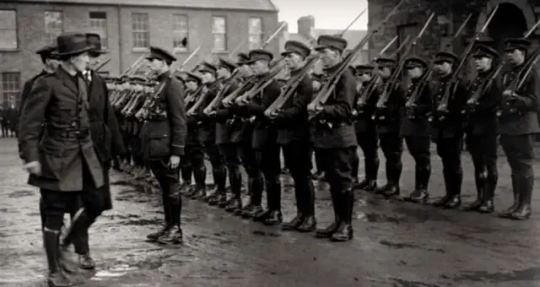
View On WordPress
#Dáil Eireann#Emergency legislation#Erskine Childers#Gen Richard Mulcahy#Irish Civil War#Kevin O’Higgins#Kilmainham Gaol#Labour TD#Michael Collins pistol#Public Safety Bill#Rand and File Volunteers#Thomas Johnson#W.T. Cosgrave
6 notes
·
View notes
Text
Letters from Carruthers
The link for the Substack.
1 note
·
View note
Text
120 Years On - Still Gripping!
Widely considered one of the best spy novels of all time, The Riddle of the Sands remains a riveting read. I had difficulty putting it down. The book really engaged me in unexpected ways.
Penned in 1903 by Erskine Childers, The Riddle of the Sands was very popular in England before World War I. It became an international best seller and was read, too, by government officials. Some credit it with…
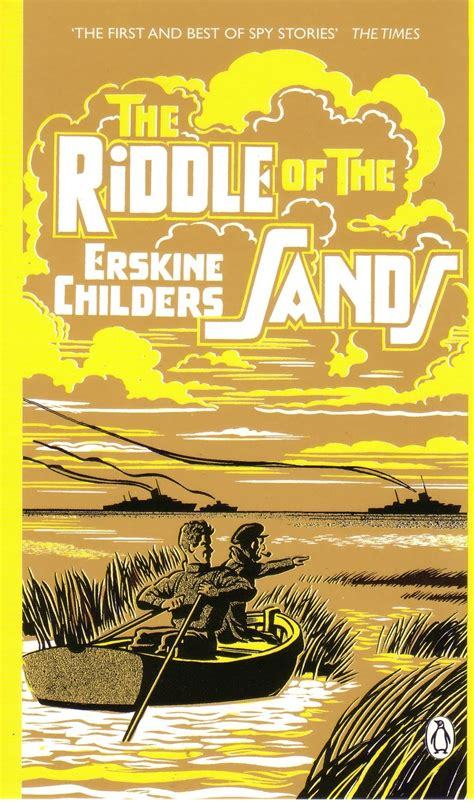
View On WordPress
0 notes
Text
A French journalist in Ireland during the Civil War - read my Irishman's Diary in today's Irish Times about Andrée Viollis in Ireland in Oct-Nov 1922.
0 notes
Text
Events 11.24 (before 1950)
380 – Theodosius I makes his adventus, or formal entry, into Constantinople.
1190 – Conrad of Montferrat becomes King of Jerusalem upon his marriage to Isabella I of Jerusalem.
1221 – Genghis Khan defeats the renegade Khwarazmian prince Jalal al-Din at the Battle of the Indus, completing the Mongol conquest of Central Asia.
1227 – Gąsawa massacre: At an assembly of Piast dukes at Gąsawa, Polish Prince Leszek the White, Duke Henry the Bearded and others are attacked by assassins while bathing.
1248 – An overnight landslide on the north side of Mont Granier, one of the largest historical rockslope failures ever recorded in Europe, destroys five villages.
1359 – Peter I of Cyprus ascends the throne of Cyprus after his father, Hugh IV of Cyprus, abdicates.
1429 – Hundred Years' War: Joan of Arc unsuccessfully besieges La Charité.
1542 – Battle of Solway Moss: An English army defeats a much larger Scottish force near the River Esk in Dumfries and Galloway.
1642 – Abel Tasman becomes the first European to discover the island Van Diemen's Land (later renamed Tasmania).
1750 – Tarabai, regent of the Maratha Empire, imprisons Rajaram II of Satara for refusing to remove Balaji Baji Rao from the post of peshwa.
1832 – South Carolina passes the Ordinance of Nullification, declaring that the Tariffs of 1828 and 1832 were null and void in the state, beginning the Nullification Crisis.
1835 – The Texas Provincial Government authorizes the creation of a horse-mounted police force called the Texas Rangers (which is now the Texas Ranger Division of the Texas Department of Public Safety).
1850 – Danish troops defeat a Schleswig-Holstein force in the town of Lottorf, Schleswig-Holstein.
1863 – American Civil War: Battle of Lookout Mountain: Near Chattanooga, Tennessee, Union forces under General Ulysses S. Grant capture Lookout Mountain and begin to break the Confederate siege of the city led by General Braxton Bragg.
1877 – Anna Sewell's animal welfare novel Black Beauty is published.
1906 – A 13–6 victory by the Massillon Tigers over their rivals, the Canton Bulldogs, for the "Ohio League" Championship, leads to accusations that the championship series was fixed and results in the first major scandal in professional American football.
1917 – In Milwaukee, nine members of the Milwaukee Police Department are killed by a bomb, the most deaths in a single event in U.S. police history until the September 11 attacks in 2001.
1922 – Nine Irish Republican Army members are executed by an Irish Free State firing squad. Among them is author Erskine Childers, who had been arrested for illegally carrying a revolver.
1929 – The Finnish far-right Lapua Movement officially begins when a group of mainly the former White Guard members, led by Vihtori Kosola, interrupted communism occasion at the Workers' House in Lapua, Finland.
1932 – In Washington, D.C., the FBI Scientific Crime Detection Laboratory (better known as the FBI Crime Lab) officially opens.
1935 – The Senegalese Socialist Party holds its second congress.
1940 – World War II: The First Slovak Republic becomes a signatory to the Tripartite Pact, officially joining the Axis powers.
1941 – World War II: The United States grants Lend-Lease to the Free French Forces.
1943 – World War II: At the battle of Makin the USS Liscome Bay is torpedoed near Tarawa and sinks, killing 650 men.
1944 – World War II: The 73rd Bombardment Wing launches the first attack on Tokyo from the Northern Mariana Islands.
0 notes
Text
On this day in Wikipedia: Friday, 24th November
Welcome, 你好, Bienvenida, Benvenuto 🤗
What does @Wikipedia say about 24th November through the years 🏛️📜🗓️?

24th November 2022 🗓️ : Event - 2022 Malaysian general election
Five days after the general elections which resulted in a hung parliament, opposition leader and former deputy prime minister Anwar Ibrahim is officially named as the 10th prime minister of Malaysia.
"General elections were held in Malaysia on Saturday, 19 November 2022. The prospect of snap elections had been considered high due to the political crisis that had been ongoing since 2020; political instability caused by coalition or party switching among members of Parliament, combined with the..."
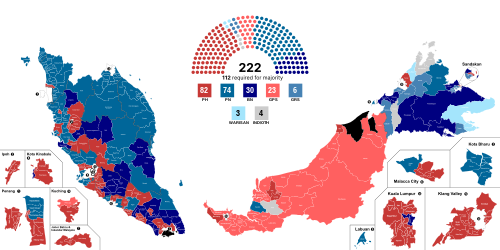
Image licensed under CC BY-SA 4.0? by Twotwofourtysix, 沁水湾, original work by Derkommander0916 under CC BY-SA 4.0
24th November 2017 🗓️ : Event - 2017 Sinai mosque attack
A terrorist attack on a Mosque in Al-Rawda, North Sinai, Egypt kills 311 people and injures 128.
"At 1:50 PM EET on 24 November 2017, the al-Rawda mosque was attacked by roughly 40 gunmen during Friday prayers. The mosque is located in the village of Al-Rawda east of the town of Bir al-Abed in Egypt's North Sinai Governorate. It is one of the main mosques associated with the Jaririya Sufi order,..."
24th November 2013 🗓️ : Event - Iran
Iran signs an interim agreement with the P5+1 countries, limiting its nuclear program in exchange for reduced sanctions.
"Iran, also known as Persia and officially the Islamic Republic of Iran (IRI), is a country in West Asia. It is bordered by Iraq to the west and Turkey to the northwest, Azerbaijan, Armenia, the Caspian Sea and Turkmenistan to the north, Afghanistan to the east, Pakistan to the southeast, the Gulf of..."
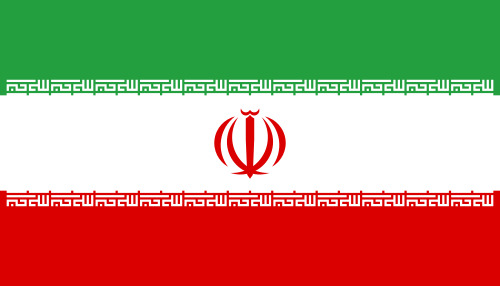
Image by See File history below for details.
24th November 1973 🗓️ : Event - Autobahn
A national speed limit is imposed on the Autobahn in Germany because of the 1973 oil crisis. The speed limit lasts only four months.
"The Autobahn (IPA: [ˈaʊtoˌbaːn] ; German plural Autobahnen, pronounced [ˈaʊ̯toˌbaːnən] ) is the federal controlled-access highway system in Germany. The official German term is Bundesautobahn (abbreviated BAB), which translates as 'federal motorway'. The literal meaning of the word Bundesautobahn is..."

Image by Qualle, Xavax and Mediatus
24th November 1922 🗓️ : Event - Irish Civil War
Irish Civil War: Irish nationalist author Erskine Childers was executed by the Irish Free State for illegally carrying a semi-automatic pistol.
"The Irish Civil War (Irish: Cogadh Cathartha na hÉireann; 28 June 1922 – 24 May 1923) was a conflict that followed the Irish War of Independence and accompanied the establishment of the Irish Free State, an entity independent from the United Kingdom but within the British Empire. The civil war was..."

Image by National Library of Ireland on The Commons
24th November 1812 🗓️ : Birth - Xavier Hommaire de Hell
Xavier Hommaire de Hell, French geographer and engineer (d. 1848)
"Ignace Xavier Morand Hommaire de Hell, often known as Xavier Hommaire de Hell, (24 November 1812 in Altkirch – 29 August 1848 in Isfahan) was a French geographer, engineer and traveller who carried out research in Turkey, southern Russia and Persia...."

Image by Jules Laurens
24th November 🗓️ : Holiday - Earliest day on which Mother's Day can fall, while November 30 is the latest; celebrated on the last Sunday in November. (Russia)
"Mother's Day is a celebration honoring the mother of the family or individual, as well as motherhood, maternal bonds, and the influence of mothers in society. It is celebrated on different days in many parts of the world, most commonly in the months of March or May. It complements similar..."

Image by William-Adolphe Bouguereau
0 notes
Text
Recap of the Anglo-Irish Treaty
The Anglo-Irish Treaty is a very controversial document that sparked the Irish Civil War. But how was it created and what did it actually do?
Truce
A truce between Britain and the IRA was declared on July 11th, 1921. According to the truce, the British agreed to:
Stop the raids and searches
Restrict military activity to support police during their normal duties
Remove the curfew restrictions
Suspend reinforcements from England
Replace the RIC with the Dublin Metropolitan Police
The IRA agreed to
Avoid provocative displays
Prohibit the use of arms
Cease military maneuvers
The IRA released a bulletin, announcing the truce which added additional terms. The British also agreed to:
No incoming troops or munitions
No military movements
No pursuit of Irish officers or men or war material
No secret agents spying
No pursuit of lines of communication
The IRA agreed to:
No attacks on crown forces and civilians
No provocative displays of forces
No interference with government or private property
No disturbing of the peace
Neither side was happy. The British claimed that waving the Sinn Fein flag was provocative and that they had to exert all discipline while the Irish didn’t have to. GHQ complained that according to the treaty the military couldn’t move freely in Ireland. After several disagreements, the British backed down and recalled its forces into their barracks. Meanwhile the IRA believed this was a temporary truce and continued to recruit, drill, and prepare for the resumption of war.
For DeValera, the preliminary negotiations were a chance to reassert himself as the leader of the Dail and Irish liberation.
Preliminary Negotiations
DeValera and an Irish delegation which comprised of Arthur Griffith, Austin Stack, Robert Barton, Count Plunkett, and Erskine Childers traveled to London on July 12th to begin preliminary discussions with Lloyd George. Dev would meet with Lloyd George 4 times between July 14th and the 21st. Lloyd George’s proposal was to turn Ireland into a Dominion but they would have no navy, no hostile tariffs, and no coercion of Ulster. Dev refused, saying that “Dominion status for Ireland would never be real. Ireland’s proximity to Britain would not allow it to develop as dominions thousands of miles away could.” Even though Dev rejected his proposal, Lloyd George continued to honor the truce and Dev returned to Dublin.
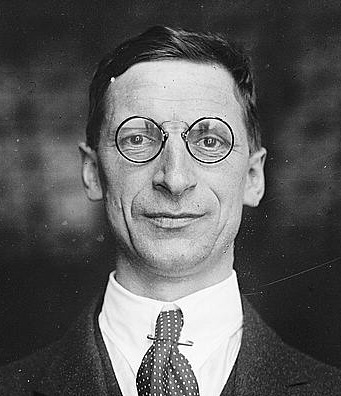
DeValera had a proposal of his own, known as Document No. 2 or External Associations, a point of controversy. This document proposed that Ireland would not be a Dominion but it would still have associations with England. When he explained it to Erskine Childers and Robert Brennan, he drew five circles inside a large circle. The large circle was England and the other circles were the Dominions it currently ruled. He then drew a circle outside of the big circle but connecting it and that was supposed to be Ireland. Unfortunately, he was either never able to properly explain his plan to his fellow Irishmen or the British cabinet or it was simply too much for people. Many of the diehard republicans found it baffling or a betrayal and the British couldn’t see how it was different from having an alliance with an independent state (and thus unacceptable). He formally shared this document with his cabinet on July 27th, but refused to share it with Lloyd George, fearing that it would be too revealing if sent to the British in its current form. It seems that Dev wanted to keep it as a compromise he might ultimately accept but wanted to see how far they could push the British before being forced to offer a compromise of their own. He sent a formal reply to Lloyd George rejecting Dominion status with a vague description of his external association plan. The British and Irish agreed to continue negotiations. A new team was to be created to represent Ireland. A team Dev refused to be a member of.
The Irish Delegation
The Irish cabinet met once more on September 9th to discuss who would go negotiate on Ireland’s behalf. This is maybe one of the most controversial moments in a rather controversial process and war. When the cabinet met that day, they were met by DeValera’s bombshell that he would not lead the Irish delegation. Additionally, he required that all of Britain’s offers be reviewed by the Dail before the Irish delegation made any agreements.
The second point of controversy was whether the goal of the negotiations was to walk away with a republic or if it was to walk away with any level of independence from Britain. Lloyd George had already made it clear that Britain would never accept a republic or full Irish independence. But where did the Irish stand?
For the entirety of the war, Dev’s title had been President of the Dail Eireann, and was changed to the President of the Irish Republic on August 26th. Was that a signal that the Republic was the goal or a formality? Members like Brugha and Mary MacSwiney were under the impression that either the British promised to recognize an Irish Republic or it was back to war. Yet, Michael Collins went on record saying that “the declaration of a Republic by the leaders of the rising was far in advance of national thought” and MacSwiney accosted Harry Boland and his and Dev’s perceived lack of commitment to a republic, and warned him to "please leave your Dual Monarchy nonsense behind you. Our oaths are to the Republic or nothing less.” Dev didn’t help at all by refusing to provide any sort of guidance to the delegation and it seems that, if Dev truly believed the republic or the External Association idea was ideal for Ireland, he never told the members of the delegation.
Finally, to make matters worse, Dev was sending the delegation as plenipotentiaries, who technically should have full powers to handle negotiations, but Dev crippled their powers by requiring that they refer back to the cabinet for major questions and with "the complete text of the draft treaty about to be signed". However, the British assumed they were normal plenipotentiaries and could not, as Viceory Lord FitzAlan told Lloyd George, “take advantage of De Valera’s absence to delay and refer back to him”
The cabinet protested Dev’s proposal strenuously, but Dev persisted and despite all this ambiguity and disbelief that Dev would not go to London, the cabinet approved the following appointments:
Arthur Griffith who would be Chairman
Michael Collins
Robert Barton, the minister of economic affairs
Eamonn Duggan, a lawyer and chief liaison officer for implementing the truce
George Gavan Duffy, another lawyer and Dail’s envoy to Rome
And Erskine Childers, Fionan Lynch, Diarmund O’Hegarty, and John Chartres as a secretaries.
DeValera dismissed Duggan and Duffy as mere legal padding, but hoped that Barton would be stubborn enough to limit the amount of compromises the Irish would have to make and trusted Childers to serve as a source of strength for Barton. Dev seems to have ignored the fact that Griffith despised Childers.
Their instructions were to negotiate and conclude a treaty of settlement, association, and accommodation between Ireland and the community of nations known as the British Commonwealth.
Treaty Negotiations
The Irish delegation arrived in London on October 8th (Collins would arrive on October 10th) and took residence at 22 Hans Place and 15 Cadogan Gardens in Kensington. The Irish representatives had accreditations that said they were negotiating on the behalf of an Irish Republic, but the British never asked to see them and Griffith never offered them, so Britain never knew it had indirectly recognized the Republic’s existence.
The first meeting took place on October 11th, at 10 Downing Street. The Irish were facing the likes of
David Lloyd George
Winston Churchill, Secretary of State for the Colonies
Lord Birkenhead, Lord Chancellor
Austen Chamberlain, Lord of the House of Commons
Sir Laming Worthington-Evans BT, Secretary of State for War
Sir Gordon Hewart, Attorney General
And Sir Hamar Greenwood, chief Secretary for Ireland
It cannot be denied the British team was more experienced and were better prepared than the Irish. They also had the benefit of being in agreement that a republic was out of the question and the goal was to get the Irish to agree to a Dominion status. They had a document all written up outlying their proposal whereas the Irish had Dev’s vague external association document and his unconnected thoughts about Ulster’s future. Yet despite their formidable reputation and skills, all were not cozy in the British delegation. For one thing, it was missing a very important player in British politics at the time: Bonar Law, the man who nearly pushed the Conservatives to civil war during the 1912 crisis and the man who would lead the Tory revolt against this very treaty that ended Lloyd George’s career. Lloyd George also had the extreme pressure from Ulster not to give an inch when it came to the Ulster exception.

David Lloyd George
[Image Description: A black and white photo of a blonde haired, white man with a thick mustache that takes over his entire lip. He is facing the camera. He is wearing a white button down shirt with a grey tie and and a grey suit]
The delegation would meet seven times between October 11th and 24th while also breaking out into three different committees: the Committee on Naval and Air Defense, the Committee on Financial Relations and the Committee on the Observance of the Truce, which consisted of members from both delegations. These committees would meet between October 12th to November 10th. After October 24th, the negotiations would be conducted through sub-conference, which met 24 times in various locations until the signing of the treaty on December 6th.
Because of the complex nature of the Irish-British relationship, a lot of time would be spent trying to figure out Irish fiscal autonomy. However, the two points that caused the most trouble between the negotiating parties was Ireland’s unity and allegiance to the Crown.
In regard to Ulster, Lloyd George had already promised the Unionists that Ulster would not be coerced and effectively recognized partition as the only solution. Lloyd George proposed creating an Ulster parliament and a boundary commission to determine the borders of the new states. Collins and Griffith hated the compromise because it was partition, but Lloyd George warned them that if they didn’t agree he would be forced to resign and they’d be facing Bonar Law, a British politician even more opposed to Irish interest than Lloyd George. They grudgingly agreed.
The nature of Ireland’s relations to the crown was a thornier problem since the Irish wanted complete legal sovereignty and the British demanded an oath of loyalty. For the British the oath represented a desperate symbol of control as they lost a part of their empire. For the Irish the oath was a literal vow of subjugation. Griffith and Collins were quick to understand that symbols meant nothing if Ireland could be guaranteed real power over her own destiny. He believed that the treaty was a stepping stone to further independence for Ireland. Put another way, what power would Britain truly have over Ireland if Ireland had an Irish government, Irish police force, Irish Army, and Irish courts?

Michael Collins and Arthur Griffith
[Image Description: A picture of two white men in suits. The man on the left is leaning to the left. He is a white man with brown hair. He is wearing a white button down shirt and a black tie with small dots. he is wearing a dark grey vest and a light grey suit. The man on the right is sitting straight with his hand in his lap. He is white with brown hair, a thick brown mustache, and round, wire frame glasses. He is wearing a white, button down shirt, a light tie, and a dark suit with black lapels]
The negotiations dragged on, pushing Lloyd George to the brink of despair. The British delegation split the Irish delegation in half and worked mostly with Griffith and Collins, creating great disgruntlement in the Irish camp. This would spell disaster for Collins and Griffith when they returned to Ireland. Fed up, Lloyd George sent the Irish an ultimatum: either they sign the treaty as it stands or refuse to sign and resume the war.
The Irish delegation was badly split. Griffith, Collins, and Duggan were in favor of the treaty while Barton and Gavan Duffy were against the treaty. Lloyd George put the pressure on the Irish delegation, claiming that he was preparing to tell Craig, his cabinet, and parliament that the negotiations had broken down. For their part, the Irish delegation was in constant communication with DeValera, insisting he come to London now and help them, but he refused. Lloyd George first got Griffith to agree to the treaty, which then forced the other Irish delegates to follow suit. The Irish delegation returned to 10 Downing Street and signed the treaty at 2:10 am on December 6th.
What exactly did they sign? In the end the treaty promised nothing that wasn’t part of the proposal prepared in July. Its main clauses were as follows:
Crown forces would withdraw from most of Ireland.
Ireland was to become a self-governing dominion of the British Empire, a status shared by Australia, Canada, Newfoundland, New Zealand and the Union of South Africa.
As with the other dominions, the King would be the Head of State of the Irish Free State (Saorstát Éireann) and would be represented by a Governor General
Members of the new free state’s parliament would be required to take an Oath of Allegiance to the Irish Free State. A secondary part of the oath was to “be faithful to His Majesty King George V, His heirs and successors by law, in virtue of the common citizenship”.
Northern Ireland (which had been created earlier by the Government of Ireland Act) would have the option of withdrawing from the Irish Free State within one month of the Treaty coming into effect.
If Northern Ireland chose to withdraw, a Boundary Commission would be constituted to draw the boundary between the Irish Free State and Northern Ireland.
Britain, for its own security, would continue to control a limited number of ports, known as the Treaty Ports, for the Royal Navy.
The Irish Free State would assume responsibility for a proportionate part of the United Kingdom’s debt, as it stood on the date of signature.
The treaty would have superior status in Irish law, i.e., in the event of a conflict between it and the new 1922 Constitution of the Irish Free State, the treaty would take precedence.
Irish Reaction
While the Treaty was celebrated in England and Lloyd George considered it a massive victory, the reaction in Ireland was quite different. DeValera refused to read the treaty and when it was published in the newspaper, he was furious it had been published without his review or approval. He publicly announced he could not “recommend the acceptance of this treaty”. Many IRA soldiers were confused and upset over the treaty’s terms, especially the oath of loyalty to the king. They couldn’t believe Collins would agree to this kind of treaty. DeValera planned to request the resignation of the three plenipotentiary members who were also in the cabinet: Collins, Griffith, and Barton, but Cosgrave convinced him to hear them out first.
Most of the military high command were in favor of ratifying the treaty, providing their reasoning during the private Dail debates on December 17th and 20th. Sean MacEoin reported that he had five hundred Volunteers and enough ammunition for seven minutes of fighting and that the British would wipe them out. Eoin O’Duffy agreed and Sean Hales, MacEoin, and O’Duffy pointed out that the intelligence situation had drastically changed as well. During the second meeting all the officers who made up GHQ and were members of the Dail and several who held commands in the country agreed that resuming the war would only end in disaster for the IRA.
Mulcahy sent out one of his many memos insisting that the army should stay out of politics and since it was an instrument of the state, it should have no opinion on public affairs. However, there were emergencies in which the State must consult with the Army heads and there were questions the army was entitled to answer. He did not believe the IRA could win militarily if the treaty was rejected and war resumed.
Griffith and Collins were under no illusions of what waited for them in London. Collins even wrote on the day he signed the Treaty:
“When you have sweated, toiled, had mad dreams, hopeless nightmares, you find yourself in London’s streets, cold and dank in the night air. Think – what have I got for Ireland? Something which she has wanted these past seven hundred years. Will anyone be satisfied at the bargain? Will anyone? I tell you this: early this morning I signed my death warrant. I thought at the time how old, how ridiculous – a bullet may just as well have done the job five years ago.” - Ronan Fanning, Fatal Path
On December 8th, the cabinet met with Collins, Barton, Griffith, and Cosgrave stating they would recommend approval of the Treaty to the Dail. De Valera, Brugha, and Stacks opposed them. They decided that the president would issue a press statement defining the position of the minority and that the Dail would hold public sessions on December 14th. During his statement Dev made it clear that he was opposed to the Treaty, starting the Dail debates on an even rockier foot and making himself the lightning rod for everyone who wanted to reject the Treaty.
The public debates broke down to two camps, the treatyites and the anti-treatyites. Those who supported the Treaty argued that the IRA had done all it could militarily do and to continue the war would be a disaster. They argued that the goal was never to drive the British to the sea but to break down that prestige which the enemy derived from his unquestionable superior force. To believe otherwise was fantasy. Collins offered his steppingstone argument and Hales argued that this was a jumping off point, and in a year or ten, Ireland will have freedom. Collins even told Hales in private that “the British broke the Treaty of Limerick [which ended the Jacobite war in 1691] and we’ll break this Treaty too when it suits us, when we have our own army.”
The Anti-treatyites refused or were unable to see Collins’ logic that this was the best they could do for now. Many did not want to accept partition, remain a part of the British empire, and especially despised the oath. And there were those in the middle, who looked to their comrades for an explanation or opinion on what to do. The problem for the anti-treatyites is that they didn’t have an alternative to offer. De Valera tried to introduce his external association idea, but it died in the water and while the anti-treatyites were full of principle, they had little else. For the treatyites it was all about accepting this limited victory in order to achieve a bigger one. As Collins put it this Treaty didn’t give the ultimate freedom, but “the freedom to achieve that end” and Mulcahy would say it provided a “solid spot of ground on which the Irish people can put its political feet.”
The Dail took a recess during Christmas and during this time, public opinion, the press, and the Church swung towards accepting the treaty. While the anti-treatyites would ignore or dismiss how the people felt, the treatyites used it to support their cause. As Christmas passed (the first Christmas Ireland had not been at war one way or another since 1914), the Dail reconvened and the attacks became increasingly personal which the Freeman’s Journal denouncing DeValera as lacking the ‘instinct of an Irishman in his blood’ and Dev accused Griffith of crookedness, and Brugha claimed that Collins was a hack who deliberately sought notoriety and had been built up as a heroic figure which he was not.
On January 7th, the final vote was taken and the Dail approved the Treaty by 64 to 57. De Valera resigned as president of the Dail Eireann on January 9th and stood for re-election. On January 10th, DeValera was defeated in the vote for the Dail presidency by 60-58 votes. He and all anti-Treaty deputies walk out, “as a protest against the election as President of the Irish Republic of the Chairman of the delegation, who is bound by the Treaty conditions to set up a state which is to subvert the republic.”
Griffith was elected President of Dáil Éireann. The Dáil was adjourned until 11 February. On January 14th the provisional government was established with Collins as Chairman.
The stage was set for Civil War
References
The Republic: The Fight for Irish Independence by Charles Townshend, 2014, Penguin Group
Fatal Path: British Government and Irish Revolution 1910-1922 by Ronan Fanning, 2013, Faber & Faber
Richard Mulcahy: From the Politics of War to the Politics of Peace, 1913-1924 by Padraig O Caoimh, 2018, Irish Academic Press
A Nation and Not a Rabble: the Irish Revolution 1913-1923 by Diarmaid Ferriter, 2015, Profile Books
Fatal Path: British Government and Irish Revolution 1910-1922 by Ronan Fanning
#irish war of independence#Ireland#Irish history#Irish Civil War#Anglo-Irish Treaty#Michael Collins#Eamon DeValera#history blog#queer historian#queer podcaster#Spotify#podcast episode
1 note
·
View note
Video
Crime stories | The Riddle of the Sands by Erskine Childers - Parrt 02 ... The novel "owes a lot to the wonderful adventure novels of writers like Rider Haggard, that were a staple of Victorian Britain". It was a spy novel that "established a formula that included a mass of verifiable detail, which gave authenticity to the story – the same ploy that would be used so well by John Buchan, Ian Fleming, John le Carré and many others." All of the physical background is completely authentic – the various Frisian islands and towns named in the book actually exist and the descriptions of them accurate (often, from the author's own experience). The same is true for the various "sands" of the title – vast areas which are flooded at high tide but become mudflats at ebb. Navigating a small boat under these conditions requires a specialized kind of skilled seamanship, of which the character Davies is an unsurpassed master, and the descriptions of his feats are of abiding interest to yachting enthusiasts, quite apart from their role in the book's espionage plot.
0 notes
Text
Erskine Childers
"Take a step or two forward, lads. It will be easier that way."
Childers last words spoken to the firing squad charged with his execution.

The Riddle of the Sands
4 notes
·
View notes
Text
throwback to that time when i was at kilmainham gaol and a tour guide complimented me for knowing who erskine childers was and i went completely red and this older american couple looked at me smiling like i was the smart kid in class and i wanted to die. i'm just here to tour the gaol don't fucking look at me
#me#kilmainham gaol#erskine childers#irish history#the anglo irish treaty#the treaty talks#the treaty#history#world history#european history
11 notes
·
View notes
Text
#OTD in 1923 – The Father of Government minister Kevin O’Higgins is shot dead by Republicans at the family home in Stradbally, Co Laois.
When the Irish Civil War broke out in June 1922, Kevin O’Higgins tried to restore law and order by introducing tough measures. Between 1922 and 1923 he personally ordered the execution of seventy-seven republican prisoners including, Rory O’Connor (who had been best man at O’Higgins’ wedding), Liam Mellows, Dick Barrett and Joe McKelvey. O’Higgins and his colleagues did not view them as prisoners…

View On WordPress
#Éamon De Valera#Dublin#Erskine Childers#Father#Ireland#Irish Civil War#Irish Mussolini#Liam Mellows#Minister Kevin O’Higgins#Rory O&039;Connor
3 notes
·
View notes
Text
Letters from Carruthers - request for interest
Would anyone here be interested in an Letters from Watson/Dracula Daily version of The Riddle of the Sands.
This 1903 book is an early example of the spy novel written by Erskine Childers, about a British government official who on a yachting holiday to the Baltic Sea, find mysterious goings on there.
I think this would be an interesting one to cover for several reasons:
It's a spy novel!
It's one of the most famous pieces of "invasion literature", the stories that hyped up the threat of Imperial Germany in the lead-up to the First World War.
It's very detailed on yachting.
Childers was an English-born Irish nationalist who ended up being executed by the Irish government for his involvement in the anti-Treaty side of the post-independence civil war, so he's not your typical Edwardian imperialist.
It's written in the first person.
It's actually a pretty good read.
31 notes
·
View notes
Text
History Wednesday: Irish War of Independence.
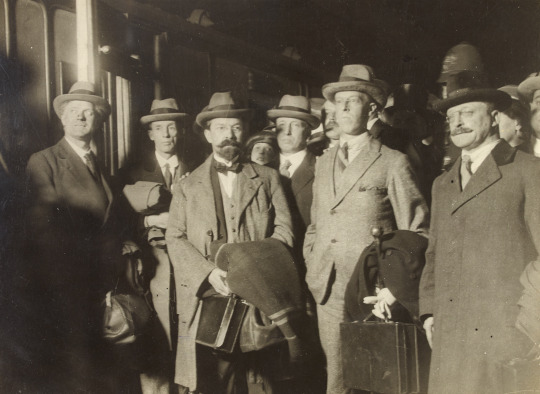
Above: The peacemakers: George Gavan Duffy, Erskine Childers, Robert Barton and Arthur Griffith in a group Photographer: W. D. Hogan Collection: Hogan Wilson Collection Date: December 1921 Source: National Library of Ireland on The Commons NLI Ref.: HOG3
OTD in 1921 Irish and British troops agreed on a ceasefire that eventually led to the signing of the “Anglo-Irish Treaty” (Irish: An Conradh Angla-Éireannach) on December 6th of the same year, which formally separated the Republic from Britain and from Northern Ireland. The truce and eventual treaty also led to the Irish Civil War, which lasted until 1923.
#on this day#july 11#otd#history wednesday#irish history#irish war of independence#arthur griffith#george gavan#erskine childers#robert banton#history of politics#history of ireland#1920s#early 20th century#National library of ireland#nli ie#w d hogan#political photo#photo jouralism#conflict#irish civil war#irish politics
10 notes
·
View notes
Text
Events 11.24
380 – Theodosius I makes his adventus, or formal entry, into Constantinople.
1190 – Conrad of Montferrat becomes King of Jerusalem upon his marriage to Isabella I of Jerusalem.
1221 – Genghis Khan defeats the renegade Khwarazmian prince Jalal al-Din at the Battle of the Indus, completing the Mongol conquest of Central Asia.
1227 – Gąsawa massacre: At an assembly of Piast dukes at Gąsawa, Polish Prince Leszek the White, Duke Henry the Bearded and others are attacked by assassins while bathing.
1248 – An overnight landslide on the north side of Mont Granier, one of the largest historical rockslope failures ever recorded in Europe, destroys five villages.
1359 – Peter I of Cyprus ascends the throne of Cyprus after his father, Hugh IV of Cyprus, abdicates.
1429 – Hundred Years' War: Joan of Arc unsuccessfully besieges La Charité.
1542 – Battle of Solway Moss: An English army defeats a much larger Scottish force near the River Esk in Dumfries and Galloway.
1642 – Abel Tasman becomes the first European to discover the island Van Diemen's Land (later renamed Tasmania).
1750 – Tarabai, regent of the Maratha Empire, imprisons Rajaram II of Satara for refusing to remove Balaji Baji Rao from the post of peshwa.
1832 – South Carolina passes the Ordinance of Nullification, declaring that the Tariffs of 1828 and 1832 were null and void in the state, beginning the Nullification Crisis.
1835 – The Texas Provincial Government authorizes the creation of a horse-mounted police force called the Texas Rangers (which is now the Texas Ranger Division of the Texas Department of Public Safety).
1850 – Danish troops defeat a Schleswig-Holstein force in the town of Lottorf, Schleswig-Holstein.
1859 – Charles Darwin publishes On the Origin of Species.
1863 – American Civil War: Battle of Lookout Mountain: Near Chattanooga, Tennessee, Union forces under General Ulysses S. Grant capture Lookout Mountain and begin to break the Confederate siege of the city led by General Braxton Bragg.
1877 – Anna Sewell's animal welfare novel Black Beauty is published.
1906 – A 13–6 victory by the Massillon Tigers over their rivals, the Canton Bulldogs, for the "Ohio League" Championship, leads to accusations that the championship series was fixed and results in the first major scandal in professional American football.
1917 – In Milwaukee, nine members of the Milwaukee Police Department are killed by a bomb, the most deaths in a single event in U.S. police history until the September 11 attacks in 2001.
1922 – Nine Irish Republican Army members are executed by an Irish Free State firing squad. Among them is author Erskine Childers, who had been arrested for illegally carrying a revolver.
1929 – The Finnish far-right Lapua Movement officially begins when a group of mainly the former White Guard members, led by Vihtori Kosola, interrupted communism occasion at the Workers' House in Lapua, Finland.
1932 – In Washington, D.C., the FBI Scientific Crime Detection Laboratory (better known as the FBI Crime Lab) officially opens.
1935 – The Senegalese Socialist Party holds its second congress.
1940 – World War II: The First Slovak Republic becomes a signatory to the Tripartite Pact, officially joining the Axis powers.
1941 – World War II: The United States grants Lend-Lease to the Free French Forces.
1943 – World War II: At the battle of Makin the USS Liscome Bay is torpedoed near Tarawa and sinks, killing 650 men.
1944 – World War II: The 73rd Bombardment Wing launches the first attack on Tokyo from the Northern Mariana Islands.
1962 – Cold War: The West Berlin branch of the Socialist Unity Party of Germany forms a separate party, the Socialist Unity Party of West Berlin.
1962 – The influential British satirical television programme That Was the Week That Was is first broadcast.
1963 – Lee Harvey Oswald, the assassin of President John F. Kennedy, is killed by Jack Ruby.
1965 – Joseph-Désiré Mobutu seizes power in the Democratic Republic of the Congo and becomes President; he rules the country (which he renames Zaire in 1971) for over 30 years, until being overthrown by rebels in 1997.
1966 – Bulgarian TABSO Flight 101 crashes near Bratislava, Czechoslovakia, killing all 82 people on board.
1969 – Apollo program: The Apollo 12 command module splashes down safely in the Pacific Ocean, ending the second manned mission to land on the Moon.
1971 – During a severe thunderstorm over Washington state, a hijacker calling himself Dan Cooper (aka D. B. Cooper) parachutes from a Northwest Orient Airlines plane with $200,000 in ransom money. He has never been found.
1973 – A national speed limit is imposed on the Autobahn in Germany because of the 1973 oil crisis. The speed limit lasts only four months.
1974 – Donald Johanson and Tom Gray discover the 40% complete Australopithecus afarensis skeleton, nicknamed "Lucy" (after The Beatles song "Lucy in the Sky with Diamonds"), in the Awash Valley of Ethiopia's Afar Depression.
1976 – The Çaldıran–Muradiye earthquake in eastern Turkey kills between 4,000 and 5,000 people.
1989 – After a week of mass protests against the Communist regime known as the Velvet Revolution, Miloš Jakeš and the entire Politburo of the Czechoslovak Communist Party resign from office. This brings an effective end to Communist rule in Czechoslovakia.
1992 – China Southern Airlines Flight 3943 crashes on approach to Guilin Qifengling Airport in Guilin, China, killing all 141 people on board.
2009 – The Avdhela Project, an Aromanian digital library and cultural initiative, is founded in Bucharest, Romania.
2012 – A fire at a clothing factory in Dhaka, Bangladesh, kills at least 112 people.
2013 – Iran signs an interim agreement with the P5+1 countries, limiting its nuclear program in exchange for reduced sanctions.
2015 – A Russian Air Force Sukhoi Su-24 fighter jet is shot down by the Turkish Air Force over the Syria–Turkey border, killing one of the two pilots; a Russian marine is also killed during a subsequent rescue effort.
2015 – A terrorist attack on a hotel in Al-Arish, Egypt, kills at least seven people and injures 12 others.
2015 – An explosion on a bus carrying Tunisian Presidential Guard personnel in Tunisia's capital Tunis leaves at least 14 people dead.
2016 – The government of Colombia and the Revolutionary Armed Forces of Colombia—People's Army sign a revised peace deal, bringing an end to the country's more than 50-year-long civil war.
0 notes
Photo

The Riddle of the Sands. A Record of Secret Service Recently Achieved. Erskine Childers. London: Smith, Elder, & Co., 1903. First edition. Illustrated with two maps and two charts.
“A keen wind from the west struck our faces, and as swiftly as it had come the fog rolled away from us, in one mighty mass, stripping clean and pure the starry dome of heaven...”
43 notes
·
View notes
Video
Crime stories | The Riddle of the Sands by Erskine Childers - Parrt 01 ... Carruthers, a minor official in the Foreign Office, is contacted by an acquaintance, Davies, asking him to join in a yachting holiday in the Baltic Sea. Carruthers agrees, as his other plans for a holiday have fallen through, and because of a heartbreak due to a woman he courted becoming engaged to another man.He arrives to find that Davies has a small sailing boat (the vessel is named Dulcibella, a reference to Childers's own sister of that name), not the comfortable crewed yacht that he expected. However, Carruthers agrees to go on the trip and joins Davies in Flensburg on the Baltic, whence they head for the Frisian Islands, off the coast of Germany. Carruthers has to learn quickly how to sail the small boat.
0 notes